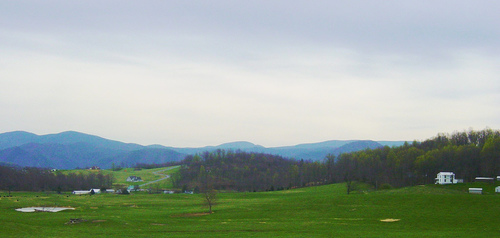
I grew up in a tiny town at the edge of North Carolina and Tennessee, in the foothills of Virginia’s Appalachian Mountain chain. It’s always been a special place to me because half of my family history is there, buried in the rich, generous soil that surrounds the house where my mother still lives. When I was little, my explorations were boundaryless. My best friend, Neal, and I wandered through stands of trees that led to glades so lush I imagined fairies or dwarves (or both!) had just been there; my sister and I dug for arrow heads – and found them – down by the family dairy barn.
Over the years, and with more sentimentality than I’d like to admit, I’ve written extensively about my home town. In college, I wrote a paper about it entitled “Boomtown”; it took on a life of its own for a time, absorbing all my available brain space and creative capacity. I kept working on it even after I submitted it to my professor because I cared so deeply about its integrity, and because I knew there was no way to say what I wanted to say about a place so set apart, a place so profoundly, indescribably my own.
When my roommates began asking about Boomtown as though it were a family member, or a pet, I knew it was time to let it go. But the effort put forth for that project and the subjects that surfaced because of it were like phosphorescence on a beach in cloud cover: tiny strobes filled with something pulsating and alive, something I wanted to touch.
After Boomtown, I knew two things: 1) That there was nothing like writing that gave me such passion or focus, and 2) That writing about the South was my gig.
People, especially educated people, give the South a hard time. We Southerners have earned a good measure of our infamy; we have behaved badly, acted ignorantly, upheld sorry rules in sorry times. We have shown poor judgment, kept to our narrow ways and spurned inclusion.
But most of us have progressed. And many of us are quite well educated, thank you. And in the midst of that overall advancement, I like to think that we have begun to till fruit-bearing soil again; that our strongest traits – the gracious, big-hearted, hot-blooded, come-hell-or-high-water types – have taken on new life.
We carry with us a stalwart pride in something akin to what I can only call a cultural landscape. This landscape goes deeper than grits; beyond silver-tongued Southern socialites; away from harsh, backward, low-down redneck banter. The depth and texture of it is born of strife, enriched and informed by a complex history of brokenness and fierce independence.
There is a great nonprofit here in Atlanta called the ArtReach Foundation (www.artreachfoundation.org). It was founded by a woman named Susan Anderson, a passionate supporter of art therapy (“art” here being an umbrella for music, dance, writing, etc.). In 2000, she and a team of art therapists helped a community in Bosnia begin to heal from the violence witnessed there. Since then, ArtReach has gone to Phuket and the Gulf Coast, creating beauty and signs of life in the wake of total destruction.
The South, too, has worked to recover from its history by way of art in all its forms. I know its music best, and it is music filled with life. From spirituals to bluegrass, the voices and fiddles from the Southland tell stories both funny and tragic, exchanging historic lodestones for levity and compassion.
As a writer, I approach this cultural landscape with lessons taken from what I know and what I grew up with. I consider my personal history, the people of my hometown, the trends its farmland bucks, and even the South as it will one day be – as a roughed-up plain of dirt spiked with arrowheads.
I must tread lightly here. I must dig. I must uncover. I must separate the bits of rock and turned-up roots from the flint, rough-hewn and ready for battle. I must seek the past and all its meanings with the careful, patient manner of a child who knows that beneath an ordinary pile of dry, fallow soil could be a treasure.
Hi Towles,
I like this entry, the way you show the importance of a place. And it seems to me that connection to a place and its meaning for you is still feeding you. That’s wonderful.
The writing aside, your website is also notable for its beauty. I love the painting, beautiful and mysterious, and the tone it sets.
LikeLike
Thank you, Richard! I actually thought a lot about you as I was writing this post, because of what you’ve written and talked about with me regarding the American South and your family’s roots in farming.
I’ve been meaning to post about the painting at the top of the site. It’s got a special meaning behind it, which I’ll save for another day …
Thank you for reading! Now YOU need to start a blog …
Towles
LikeLike
Your words challenge me, and make me squirm. You know I struggle with accepting the South, which is a part of me (grumble grumble). You’ve reminded me that there actually is some treasure worth looking for in this insane place I live.
Thanks for the push to keep wrestling with it, rather than turning my back.
LikeLike
ML –
If I lived in a smaller town, I might have a harder time seeing the South’s strong points, but they are there! Just remember that you can be a catalyst where you live. 🙂 Great talking with you yesterday.
T
LikeLike
Tiny,
You are one helluva writer.
LikeLike